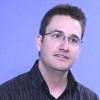InfoQ Homepage DevOps Content on InfoQ
-
Eric Nelson on VS 2010 and .NET 4.0
In this interview Eric Nelson talks about what’s coming in VS 2010, the C# – VB.NET convergence, the introduction of Parallel as a library, and Azure cloud computing.

-
Joseph Molnar discusses scanR
In this interview from QCon San Francisco 2008, Joseph Molnar discusses scanR, choosing .Net for scanR, the architecture of scanR, working with mobile carriers, scaling, challenges which were encountered, .Net components and libraries used, major problems encountered and their solutions, managing scanR, and what would be done differently if scanR was rewritten from scratch.

-
Geir Magnusson on Cloud Computing
Geir Magnusson answers questions about the definition of Cloud Computing, how cloud computing affects application development, concerns about vendor lock-in, the impact of open source for in Java evolution, Apache Harmony, and Apache Geronimo projects

-
Ross Mason Discusses MuleSource, Mule ESB and Galaxy
In this interview from QCon San Francisco 2008, Ross Mason discusses Mule, the role of an ESB, Enterprise Edition versus Community Edition, monitoring and MuleHQ, REST support, cloud-based deployments, Galaxy, governance, Mule integrations, community interaction via MuleForge, and the impact of the current recession upon open source software.

-
Development Tools for the Open Web
Dion Almaer and Ben Galbraith open with a definition of the Open Web, the tension arising from multiple Web technologies, the diversity and "polyphony" of Open Source, the future of Web development tools, and the debate associated with the possible evolution of Javascript. The potential impact of HTML 5 on tool and Web development in general is discussed.

-
Stu Charlton on Cloud Computing
In this interview from QCon San Francisco 2008, Stu Charlton discusses cloud computing, differences between traditional and cloud hosting, platform versus infrastructure cloud, how cloud will change software development and deployment, avoiding vendor lock-in, moving a system into the cloud, the benefits of clouds to small/medium size businesses, and cloud tool support.

-
Erik Meijer on LINQ
In this interview filmed during QCon SF 2008, Erik Meijer talks about less known LINQ features, like the ability to do meta programming or the fact that LINQ works against any data collection that implements the sequence operators. Meijer also talks about the differences between functional languages and objectual ones, asynchronous computation, and the evolution of languages.

-
Rob Harrop on SpringSource dm Server and OSGi
In this interview made by InfoQ’s Srini Penchikala, Rob Harrop talks about SpringSource dm Server, its OSGi based modularity and the advantages it offers. He also touches other adjacent topics like support for Java EE6, cloud computing, JMX, and others.

-
Rod Johnson About Spring Framework 3.0 & Others
In this interview made by Srini Penchikala, with the participation of Ryan Slobojan, Rod Johnson answered many questions about Spring Framework 3.0 and other applications developed under SpringSource’s umbrella - Tool Suite, Integration, Web Flow, Batch – talking about their current status and existing plans for the future.

-
Damien Katz Relaxing on CouchDB
In this interview, Damien Katz talks about CouchDB, a distributed, fault tolerant, document oriented database developed by Apache Incubator. CouchDB is written in Erlang, and the database is accessed through an HTTP/JSON API. The database view engine is run on JavaScript, but other languages have been used like Ruby and Python.

-
Dan Farino On MySpace’s Architecture
In this interview taken by InfoQ’s Ryan Slobojan, Dan Farino, Chief Systems Architect at MySpace, talks about the system architecture and the challenges faced when building a very large online community. Because MySpace is built almost entirely on the .NET Framework, Dan explains how a .NET product scales on hundreds of servers.

-
John Lam on IronRuby, Microsoft and Open Source
In this interview from RubyFringe, John Lam talks about his work on IronRuby and how Microsoft is approaching Open Source software development.
